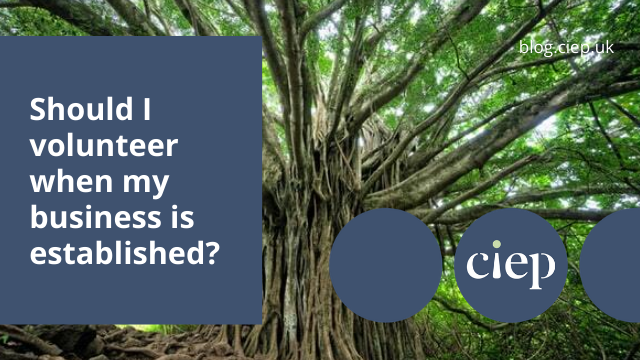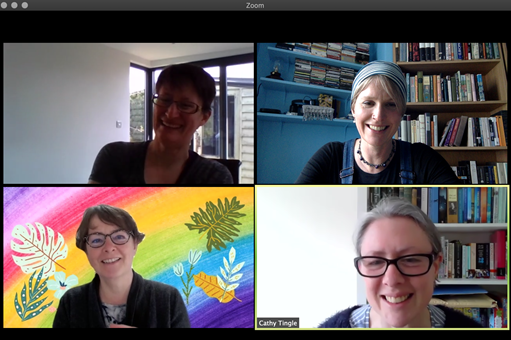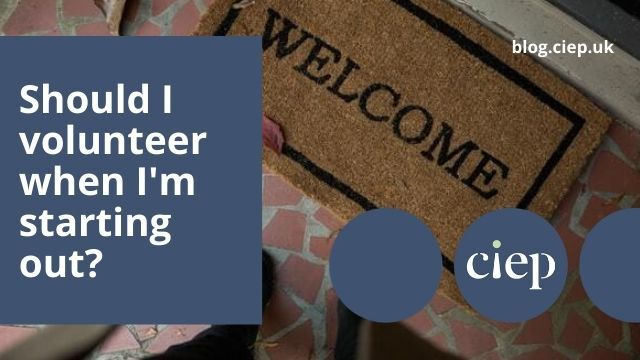Many editors and proofreaders volunteer time and skills at the beginning of their careers to gain valuable experience that might lead to paid work. But once you’re established in your business, with a regular client base, what are the benefits of volunteering? We talked to some CIEP members to find out how volunteering works in a more settled career landscape. In a previous blog, we looked at volunteering when you’re just starting out, and covered the questions you need to ask yourself before giving away your valuable time.
- Value-led volunteering
- Making yourself useful
- Helping colleagues out
- Supporting the wider editorial community
- Reaching across the earth
- Giving back
Value-led volunteering
All volunteering is value-led to an extent, but for some of our members their values are the deciding factor in working out what volunteering work to take on.
CIEP Professional Member Ben Dare says: ‘I have offered voluntary proofreading to a number of organisations that I knew were either volunteer-led or had very restricted budgets. I thought that all of them were interesting or aligned with my values.’
In the end, some of this value-led voluntary work turned into value-led paid work:
- One turned into a counter-offer of a few hours a week of paid work.
- One connected Ben with a publisher’s editorial assistant, also volunteering, who connected him with their publisher. That turned into a number of proofreads, Ben’s first copyedits, and an ongoing relationship with the publisher.
- One organisation incorporated Ben’s work into their funding applications so that they could start paying him for his work on their projects.
- One remained a voluntary role, but it was fun and meaningful.
- One remained voluntary with a paid project in the middle and the possibility of more in future.
Ben continues: ‘I also offered to do an unpaid proofread for a few charities when Covid was at its peak, knowing that finances were so uncertain, but also not expecting it to remain voluntary for future projects.’
- One insisted they pay and sent a few projects Ben’s way.
- One took a voluntary proofread and continues to follow up with paid projects, and referred Ben to another client.
- One took a voluntary proofread and continues to follow up with paid projects.
Even with this impressive return, and a client base that increasingly reflects his values, Ben consistently offers a certain proportion of his hours for free. From his records, he has noticed that his percentage of voluntary hours has remained at around 10%. He says:
While I’d obviously have been better off had all those voluntary hours been paid, it’s not a big portion on paper. The important thing is that I only offered voluntary proofreading where I thought there was a need, and when I knew I would be satisfied doing the work, paid or not.
 Making yourself useful
Making yourself useful
Some people volunteer long term for one organisation when there is absolutely no chance of ever being paid for it. Editing church or other faith-based magazines is a good example of this. CIEP Intermediate Member Annie Deakins has been volunteering for her monthly parish magazine since 2017. Her account of how this has benefited her, giving her skills that have helped her wider career, echoes the experiences of some of our newer members:
2017: I offered to proofread the monthly parish magazine for the local church. I was an Entry-Level member. I learnt how to use the PDF tools.
2018: The magazine editor retired, so she trained me to take over. I learnt about having a style sheet.
2019: A new church administrator was appointed. Her job role was tightened, so I took over invoicing the advertisers. I placed my own advert for proofreading services. I learnt about communication, diplomacy and tact. Very handy when querying.
2020: The vicar got promoted. She had done all the church social media. She taught me how to do it. I learnt how to market my own business.
There’s no denying that volunteering will push you towards skills and knowhow that you might not feel comfortable trialling in a paid role. However, for Annie, it’s also about offering a talent that’s genuinely useful to others:
I still volunteer with the Publicity Group at church because that is where my talents lie. I’m not happy doing catering, DIY or Finance. Therefore I do the church social media (Facebook, Twitter, Instagram) and edit the church magazine.
During lockdown, when we weren’t sending the magazine to print, I still produced an online PDF version, accessible from the church website. Usually the magazine is printed in black and white with a colour cover. During lockdown, when it was online only, the illustrations on each page could be in colour, which made each issue cheerier and raised spirits. Even if they didn’t have the hard copy in their hands, I still felt that my volunteering was valued.
Helping colleagues out
Kath Kirk (Gecko Edit) and Christina Petrides (Last Glance), both Intermediate Members of the CIEP, trade their skills by editing each other’s blogs before publication. Working in different sectors – Kath edits fiction and educational materials while Christina focuses on academic and business editing – there’s rarely overlap in their blog material. Their informal barter arrangement benefits them both, and pushes them to dig into aspects of editing that they might not encounter in their usual work.
Sue Littleford, our columnist on business matters, explains how this arrangement works tax-wise:
If you swap proofreading services with a friend for your blogs or your websites, you need to enter the cash value of the services received and rendered in your accounts, too. If they balance, it’s ‘free’ in monetary terms (other than your time), as the tax liability will exactly offset the tax relief. But if you spend one hour on your friend’s blog and your friend spends two on yours, there’d be greater tax relief than the tax liability (and vice versa), which is why it has to go through your accounts.
 Supporting the wider editorial community
Supporting the wider editorial community
As a non-profit organisation, the CIEP relies on voluntary help. Its directors give a certain number of hours voluntarily every month, for example. Our social media team (SMT) is made up of volunteers, too. Obviously we have to keep the names of these ninja-like communicators secret, but one comments:
I’ve learnt about tone of voice, and tweeting for the CIEP has sharpened my copywriting skills. Being a member of the team has thrown me together with CIEP members with similar interests, eg in content marketing and user design. I feel I better understand engagement, and I’ve learnt how to write for the different social media platforms. All really useful for my business. And when I was starting out, I learnt about loads of interesting organisations in the publishing world by seeing who the CIEP follows on Twitter etc.
Another says: ‘I think it’s contributed to my appreciation of the wider industry. This can be a solitary old existence, so the team itself is a benefit. In terms of specific skills: awareness of use of appropriate language (gender-neutral pronouns!) and improved skills with web platforms, Slack, SmarterQueue, which is all very useful.’
Louise Harnby, the CIEP’s social media director (at the time of writing), testifies to the value of her team:
I work with an exceptional team of volunteers who deliver every piece of content that engages with the wider publishing and editing community. That frees up my time to focus on strategy and scheduling content that promotes membership growth, training, blog content, and our Directory of Editorial Services.
A team approach ensures the CIEP’s social media strategy is framed in a way that reaches beyond the bubble of a single director. Instead, there’s a support group in which we can share ideas about how best to put the strategy into practice – whether that be the design of our branded templates or the timing of our posts. Plus, there’s more than one set of eyes on our social media feeds and the questions our followers are asking. That’s more enjoyable and more effective.
Being a member of the SMT requires being able to write pithy messages that are engaging but hold our brand tone of voice, understand the principles behind content and social media marketing, and evaluate a post’s relevance and its alignment with CIEP values. For that reason, our volunteer editors and proofreaders tend to have some experience when they come on board.
Over the past few years the size of the SMT has decreased. But what’s stayed the same is the value and expertise our volunteers bring to the table. I love working with them and learning from them. And I’m very thankful for them! Delivering our social media strategy would be impossible without them.
Reaching across the earth
CIEP Professional Member Sarah Dronfield has become known among editors worldwide for running weekly blog round-ups on the Editors’ Association of Earth Facebook Page. She became a member of the editing community on Facebook soon after starting her editing and proofreading business in 2016, and explains how she spotted a need:
Lots of editors were saying that they read blog posts or listened to podcasts as part of their continuing professional development. I knew it was possible to follow individual blogs, but I thought it would be handy for us to have all the latest posts in one place to dip in and out of during coffee breaks, so in 2017 I started a weekly blog round-up in the Editors’ Association of Earth (EAE) Facebook group.
Later that year I took over the running of the weekly accountability thread in another of the EAE groups. That thread is a place for editors to share what they’ve done that week to market their business or advance their professional development. Many editors form their own private accountability groups with others who are at a similar stage in their career or who work in the same field, and the thread is useful for those who are not part of such a group. Having said that, I know lots of editors (myself included) who are in a private accountability group but still like to participate in the weekly EAE thread!
Posting these weekly threads makes me feel like I’m giving something back to the community that helped me so much when I was starting out. It also gives me a routine and a sense of normality that is essential these days.
Giving back
So, why do they do it? At this point in these professionals’ careers, their motivation isn’t so much future employment but adding something to their working lives. Volunteering can lead to work, but often it’s something that runs regularly alongside work, taking up a fairly predictable amount of time. It’s a way of getting CPD and forming new contacts as well as gaining satisfaction from helping in a way that’s consistent with their values. They’re giving something back, which may in time encourage others to do the same.
Do you volunteer? What do you do, and why? Let us know in the comments below!
Written by the CIEP information team. With thanks to the CIEP members who generously shared their experiences.
About the CIEP information team
Liz Jones, Abi Saffrey and Cathy Tingle are the CIEP’s information commissioning editors. If there’s a topic that you would like to see covered in a blog post, fact sheet, focus paper or guide, drop the team a line at infoteam@ciep.uk.
 About the CIEP
About the CIEP
The Chartered Institute of Editing and Proofreading (CIEP) is a non-profit body promoting excellence in English language editing. We set and demonstrate editorial standards, and we are a community, training hub and support network for editorial professionals – the people who work to make text accurate, clear and fit for purpose.
Find out more about:
Photo credits: tree by Brandon Green; Why Not? by Ian Dziuk; sprout by Sushobhan Badhai, all on Unsplash.
Posted by Abi Saffrey, CIEP blog coordinator.
The views expressed here do not necessarily reflect those of the CIEP.




